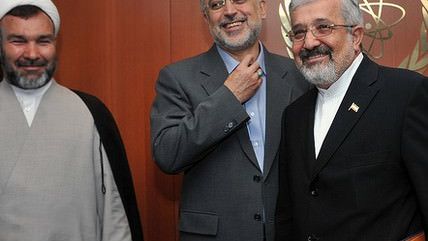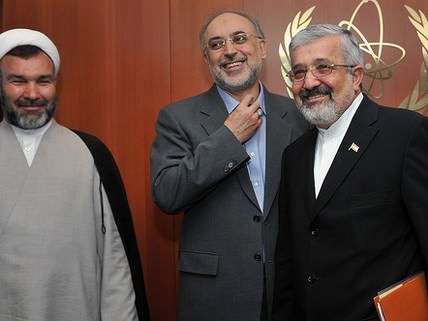Is the Iran-IAEA Side Deal a Big Deal?
Iran can reportedly use its own experts to inspect sites where weapons research was alleged to have taken place.


The Associated Press reports on a secret side deal between Iran and the International Atomic Energy Agency (IAEA) over how certain inspections related to prior claims that Iran did nuclear weapons research would be handled:
Iran will be allowed to use its own inspectors to investigate a site it has been accused of using to develop nuclear arms, operating under a secret agreement with the U.N. agency that normally carries out such work, according to a document seen by The Associated Press.
The revelation on Wednesday newly riled Republican lawmakers in the U.S. who have been severely critical of a broader agreement to limit Iran's future nuclear programs, signed by the Obama administration, Iran and five world powers in July. Those critics have complained that the wider deal is unwisely built on trust of the Iranians, while the administration has insisted it depends on reliable inspections.
According to the AP, the U.S., the U.K., France, Germany, China, and Russia were briefed on the deal and "endorsed it as part of the larger package." That package has to be approved or rejected by the Congress by September 17, a date set based on a process laid out in the Iran Nuclear Review Act, which Congress passed earlier this year. Under the legislation, if Congress votes to disapprove the deal, President Obama can veto their disapproval. If Congress doesn't vote either way, it will be considered the same as if they voted for it.
Under the side deal, as reported by the AP, the IAEA will, in some unspecified way, "ensure the technical authenticity" of Iran's inspections of its site. Critics of the Iran deal call the confidential arrangement between Iran and the IAEA "unprecedented." Seperately, Sen. Lindsey Graham (R-S.C.) has said he would push to cut off U.S. funding for the IAEA if its confidential arrangements with Iran (there are reportedly at least two, including this one) were not disclosed. The IAEA is supposed to submit a final report on Iran's alleged nuclear weapons research by December. The U.S. and the other countries that reached a deal with Iran in July will be among the countries voting to approve or reject that report.
The International Atomic Energy Agency is tasked with monitoring member states' nuclear activities. Inspections focused on Iran's past and its future will be done under the auspices of the IAEA, not the United States. Insofar as that keeps the U.S. from bringing a new international security responsibility on itself, that's a good thing. It doesn't excuse the confidential nature of the agreement, nor the Obama administration's prior insistence there was nothing unusual about any of the side deals, both of which now work against the wider deal's passage. If Congress actually found the intestinal fortitude to withdraw from the IAEA over this, that wouldn't necessarily be a bad thing. Despite the rhetoric, there's limited U.S. national security interests in preventing nuclear proliferation.
The White House issued a statement expressing confidence in the IAEA's arrangement with Iran, declining to confirm specifics but acknowledging they were unique. "We are confident in the Agency's technical plans for investigating the possible military dimensions of Iran's former program, issues that in some cases date back more than a decade," National Security Council spokesman Ned Price said, according to Fox News. "Just as importantly, the IAEA is comfortable with arrangements, which are unique to the Agency's investigation of Iran's historical activities. When it comes to monitoring Iran's behavior going forward, the IAEA has separately developed the most robust inspection regime ever peacefully negotiated to ensure Iran's current program remains exclusively peaceful."


Show Comments (146)